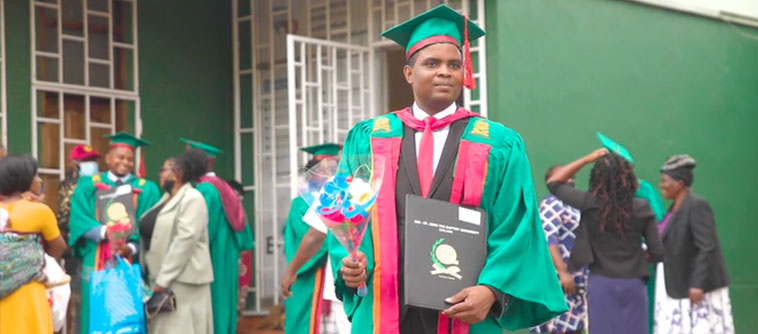Wongani Chisati and Kennedy Black are celebrating their achievements. The two young Malawians graduated this spring, having had their studies funded by Kwera, an educational social enterprise set up by Jimmy Scavenius (EMBA 2013). The two graduates respectively studied medical laboratory science and business administration. As they prepare to further their ambitions in the world of work, they will provide both inspiration and financial support for Kwera’s next generation of Student Climbers.
Kennedy Black, Kwera’s very first Student Climber, takes his position as an alum and role model seriously. “It’s an honor,” said the 29-year-old. “I’m very excited to be the first graduate from Kwera. I will try to be an example to the Student Climbers who are following me.”
Meanwhile, his fellow alum, Wongani Chisati, has secured her first job as a laboratory technologist at Apex Medical Laboratories, where the 23-year-old performs diagnostic lab analyses that enable appropriate treatment.
“I look forward to progressing with my career in terms of research and filling in the gaps in terms of biological sciences in Malawi. This has definitely been a life-changing opportunity,” she said.
In Chisati and Black’s footsteps come the next cohort of Student Climbers, in subjects as diverse and future-focused as sustainable energy systems, biomedical engineering, and agribusiness management, to name a few. In a country with Africa’s lowest number of graduates – less than 1% of the population goes to university – their goals could have lasting impact not only on the country’s economy, but its citizens’ social and health outcomes, too.
It is precisely for this reason – impact-driven development – that the social enterprise was founded. Kwera, which means “to climb” in Chichewa, Malawi’s native language, finds and funds top students through their university courses and couples its financial support with a four-year skills development program. The aim is to create tomorrow’s leaders, equipped with the education and the skills to succeed in any environment. For its founder Scavenius, the project is his life’s work.
“After my EMBA I decided to pursue that and help people in the world who basically didn’t win the birthplace lottery,” explained Scavenius. As a Dane, he is all too aware of the privileges that his own birthplace conferred upon his own life chances.
Many of his IMD course colleagues reached into their own pockets to fund Kwera’s first Student Climbers. Ninety-seven percent of their donations went directly toward paying their tuition and developing their skills. Thanks to these donations, Chisati and Black graduated debt-free and will now pay a percentage of their salaries to Kwera to fund the next cohort of Student Climbers. The model, therefore, is set up to enable exponential scalability. For that reason, Black and Chisati’s success has a far greater significance than their individual achievement.
“It’s a huge milestone that our first Student Climbers are now graduating, not only to support them but to show the world that the model is working,” said Scavenius. “Kwera is an efficient, sustainable business – it is built into our model.”
With the next generation of Student Climbers already en route, Kwera’s mission of not only financing individuals, but creating an alumni network of highly educated people who will transform their communities – is changing the lives of Malawians each day.



